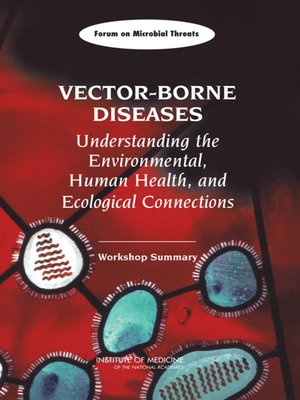Vector-Borne Diseases
ebook ∣ Understanding the Environmental, Human Health, and Ecological Connections: Workshop Summary
By Institute of Medicine

Sign up to save your library
With an OverDrive account, you can save your favorite libraries for at-a-glance information about availability. Find out more about OverDrive accounts.
Find this title in Libby, the library reading app by OverDrive.



Search for a digital library with this title
Title found at these libraries:
| Library Name | Distance |
|---|---|
| Loading... |
Vector-borne infectious diseases, such as malaria, dengue fever, yellow fever, and plague, cause a significant fraction of the global infectious disease burden; indeed, nearly half of the world's population is infected with at least one type of vector-borne pathogen (CIESIN, 2007; WHO, 2004a). Vector-borne plant and animal diseases, including several newly recognized pathogens, reduce agricultural productivity and disrupt ecosystems throughout the world. These diseases profoundly restrict socioeconomic status and development in countries with the highest rates of infection, many of which are located in the tropics and subtropics.
Although this workshop summary provides an account of the individual presentations, it also reflects an important aspect of the Forum philosophy. The workshop functions as a dialogue among representatives from different sectors and allows them to present their beliefs about which areas may merit further attention. These proceedings summarize only the statements of participants in the workshop and are not intended to be an exhaustive exploration of the subject matter or a representation of consensus evaluation. Vector-Borne Diseases : Understanding the Environmental, Human Health, and Ecological Connections, Workshop Summary (Forum on Microbial Threats) summarizes this workshop.






